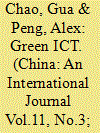|
|
|
Sort Order |
|
|
|
Items / Page
|
|
|
|
|
|
|
| Srl | Item |
| 1 |
ID:
127201


|
|
|
|
|
| Publication |
2014.
|
| Summary/Abstract |
India is poised to spend over USD 5.8 billion as part of the National Smart Grid Mission aimed to alleviate India's ailing power sector as part of its 12th Five year plan (2012-2017). The federal government sponsored Restructured Accelerated Power Development and Reforms Program (R-APDRP) is also focused on building ICT capability in the state electricity boards. Presently however, there is no power sector specific cyber security mandates or policies in India. The Stuxnet, Shamoon and Anonymous incidents have shown that cyber attacks can cause significant damage and pose a risk to National Critical Infrastructure. A lack of security planning as part of designing the Smart grids can potentially leave gaping holes in the country's power sector stability. The paper highlights key cyber security threats across the entire power sector value chain-from generation, to transmission and distribution. It is aimed at building the case for power sector specific cyber security regulations based on the experience of regulators in other critical infrastructure sectors like Banking and Telecom in India and power sector regulations internationally.
|
|
|
|
|
|
|
|
|
|
|
|
|
|
|
|
| 2 |
ID:
126785


|
|
|
|
|
| Publication |
2013.
|
| Summary/Abstract |
Under the national strategy of a "let informatisation drive industrialisation, and let industrialisation promote informatisation", China's electronic information industry has achieved continuous and dramatic development during the last three decades. It has now become one of the most essential pillar industries for China's national economy. However, severe pollution issues and environmental challenges emerge at different stages throughout the lifecycle of Information and Communication Technology (ICT) products, from their design, development, and manufacturing to use and to disposal. Evidence shows that much effort has been put to increase industrial profit margin, improve indigenous innovation, and overcome the negative effects of the 2008 financial crisis on China's electronic information industry. Nevertheless, environmental issues have traditionally received less attention from industrial manufacturers and users of ICT products (e.g. CEOs, managers and employees of companies, and individual citizens). China is still in its infant stage in building up a green electronic information industry. This paper discusses and highlights the importance and impacts of current environmental challenges faced by the electronic information industry, as well as to propose the implementation of Green ICT as a key strategy to ensure environmental-friendly use of ICT equipments and thus maintain sustainable development of this industry in the long term.
|
|
|
|
|
|
|
|
|
|
|
|
|
|
|
|
| 3 |
ID:
133950


|
|
|
|
|
| Publication |
2014.
|
| Summary/Abstract |
How does access to information communication technology (ICT) affect who gets heard and what gets communicated to politicians? On the one hand, ICT can lower communication costs for poorer constituents; on the other, technological channels may be used disproportionately more by the already well connected. To assess the flattening effects of ICTs, we presented a representative sample of constituents in Uganda with an opportunity to send a text message to their representatives at one of three randomly assigned prices. Critically, and contrary to concerns that technological innovations benefit the privileged, we find evidence that ICT can lead to significant flattening: a greater share of marginalized populations use this channel compared to existing political communication channels. Price plays a more complex role. Subsidizing the full cost of messaging increases uptake by over 40%. Surprisingly however, subsidy-induced increases in uptake do not yield further flattening since free channels are not used at higher rates by more marginalized constituents.
|
|
|
|
|
|
|
|
|
|
|
|
|
|
|
|
| 4 |
ID:
127571


|
|
|
|
|
| Publication |
2014.
|
| Summary/Abstract |
One of the notable trends of the past century that will likely continue to strongly influence global politics in this century is the current information revolution. And with this information revolution comes an increase in the role of soft power-the ability to obtain preferred outcomes by attraction and persuasion rather than coercion and payment. Information revolutions are not new-one can think back to the dramatic effects of Gutenberg's printing press in the sixteenth century. But today's information revolution is changing the nature of power and increasing its diffusion. Sometimes called "the third industrial revolution," the current transformation is based on rapid technological advances in computers and communications that in turn have led to extraordinary declines in the costs of creating, processing, transmitting, and searching for information
|
|
|
|
|
|
|
|
|
|
|
|
|
|
|
|
| 5 |
ID:
124257


|
|
|
|
|
| Publication |
2013.
|
| Summary/Abstract |
Ghana's pursuit of socio-economic growth has necessitated joining the information communication technology (ICT) revolution, thus increasing the consumption and obsolescence rate of electrical and electronic equipment (EEE) and the creation of what is popularly called e-waste. The absence of legislation governing its importation and disposal, combined with the dynamics of Accra's urban economy, including neo-liberal policies and lack of formal job opportunities, has triggered people's ingenuity to engage in novel occupations such as e-waste recycling. Though a lucrative strategy, it comes with a price for those involved: environmental health risks, a fact well articulated by a burgeoning literature. Nevertheless, little empirical evidence exists relating to this perceived relationship. Using questionnaires, FGDs and in-depth interviews, this study fills the lacuna. The findings reveal that the mean daily income of an e-waste worker is GH¢??, far above the daily minimum wage of GH¢?·??. Despite the positives, the findings also show that the environment and health can be compromised.
|
|
|
|
|
|
|
|
|
|
|
|
|
|
|
|
|
|
|
|
|